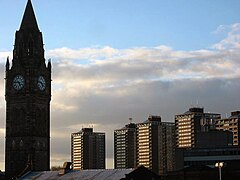Rochdale
| Rochdale | |
|---|---|
 Rochdale Town Hall with the College Bank Flats behind |
|
| Rochdale shown within Greater Manchester | |
| Population | 107,926 (2011 Census) |
| OS grid reference | SD893130 |
| • London | 169 mi (272 km) SSE |
| Metropolitan borough | |
| Metropolitan county | |
| Region | |
| Country | England |
| Sovereign state | United Kingdom |
| Post town | ROCHDALE |
| Postcode district | OL11, OL12, OL16,OL15,M24 |
| Dialling code | 01706/0161 |
| Police | Greater Manchester |
| Fire | Greater Manchester |
| Ambulance | North West |
| EU Parliament | North West England |
| UK Parliament | |
Rochdale /ˈrɒtʃdeɪl/ is a market town in Greater Manchester, England, positioned at the foothills of the South Pennines on the River Roch, 5.3 miles (8.5 km) north-northwest of Oldham, and 9.8 miles (15.8 km) north-northeast of the city of Manchester. Rochdale is surrounded by several smaller settlements which together form the Metropolitan Borough of Rochdale, population 211,699. Rochdale is the largest settlement and administrative centre, with a total population of 107,926.
Historically a part of Lancashire, Rochdale's recorded history begins with an entry in the Domesday Book of 1086 under Recedham Manor. The ancient parish of Rochdale was a division of the hundred of Salford and one of the largest ecclesiastical parishes in England comprising several townships. By 1251, Rochdale had become important enough to have been granted a Royal charter. Subsequently, Rochdale flourished into a centre of northern England's woollen trade, and by the early 18th century was described as being "remarkable for many wealthy merchants".
Rochdale rose to prominence during the 19th century as a major mill town and centre for textile manufacture during the Industrial Revolution. It was a boomtown of the Industrial Revolution, and amongst the first ever industrialised towns. The Rochdale Canal—one of the major navigable broad canals of the United Kingdom—was a highway of commerce during this time used for the haulage of cotton, wool and coal to and from the area. The socioeconomic change brought by the success of Rochdale's textile industry in the 19th century led to its rise to borough status and it remained a dominant settlement in its region. However, during the 20th century Rochdale's spinning capacity declined towards an eventual halt.
...
Wikipedia

